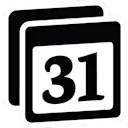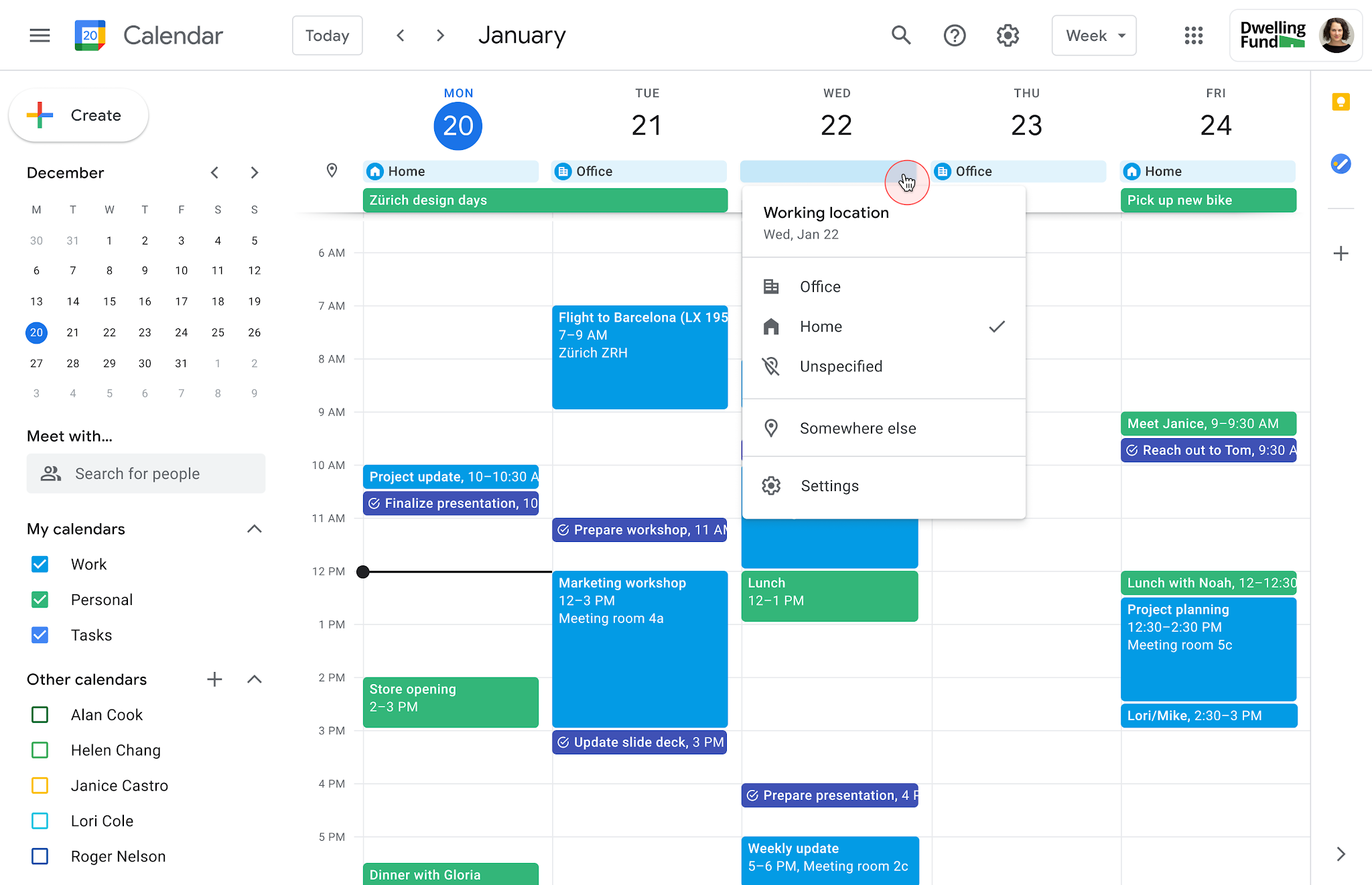Back to all comparisons
Notion Calendar vs Google Calendar
Comprehensive comparison to help you choose the right tool for your needs

Notion Calendar
4.6
Notion Calendar is a comprehensive tool for managing time and work together. It integrates seamlessly with Google Calendar, allowing you to view and manage events alongside project timelines in Notion. The calendar offers built-in scheduling, time zone support, and a modern design, making it ideal for both personal and professional use. It's available in multiple languages and can be accessed on various platforms.
Free
Visit Website Google Calendar
4.6
Google Calendar is a free tool for scheduling, with features like event creation, Google service integration, and mobile access
Free to use
Visit Website Quick Summary
Notion Calendar Strengths
- Google Calendar Integration: This feature allows users to seamlessly connect their Google Calendar with Notion, enabling efficient management of events and meetings within a unified interface. It simplifies scheduling and updating events across platforms.
- Meeting Booking Functionality: Notion Calendar offers a user-friendly interface for scheduling meetings. This includes options for setting up recurring meetings, sending invitations, and managing RSVPs, streamlining the meeting planning process.
- Notion Page Connectivity: Users can link calendar events to specific Notion pages, facilitating better organization and access to related notes, tasks, or documents associated with an event. This integration enhances productivity and project management.
- Video Conferencing Integration: The calendar supports adding video conferencing links from popular platforms like Zoom and Google Meet directly into event details. This feature is particularly useful for remote teams and virtual meetings, offering convenience and efficiency.
Google Calendar Strengths
- Seamless Integration with Google Services: Google Calendar is tightly integrated with Google's ecosystem, including Gmail for event invitations, Google Meet for video conferencing directly from calendar invites, and Google Tasks for task management. This integration enhances productivity by keeping all tools in one accessible location.
- Easy Event Scheduling and Sharing: The platform enables users to quickly add events, set reminders, and share their calendars with others. This feature is designed to facilitate collaboration and ensure that scheduling meetings or events is a hassle-free process, making it ideal for both personal and professional use.
- Customizable Views and Event Colors: Users can customize their calendar views (day, week, month, or year) and assign colors to different events, making it easier to manage and visually distinguish between various types of appointments or tasks at a glance.
- Recurring Events and Reminders: Google Calendar supports the creation of recurring events and configurable reminders, which can be set to notify users via email or pop-up messages. This ensures that important dates are not missed and helps in establishing routines.
Notion Calendar Screenshot
:format(webp)/cdn.vox-cdn.com/uploads/chorus_asset/file/25231452/NotionCalendar_Asset__1_.png)
Google Calendar Screenshot

Feature Comparison
| Feature | Notion Calendar | Google Calendar |
|---|---|---|
| Platforms | macOS, iOS, Android, Web, Windows | macOS, iOS, Android, Web |
| Integrations | Notion, Zoom, Google Calendar | ClickUp, Google Tasks, Zoom, Slack, Salesforce, Google Docs |
| Calendar | Yes | Yes |
| Task Management | No | NA for Calendar |
| Natural Language Processing | No | Yes |
| Analytics | No | No |
| Time Blocking | Yes | Yes |
| Time Zones | Yes | Yes |
| Scheduler | Yes | Yes |
| Notifications | Yes | Yes |
| Pricing | Free | Free to use |
| Customer Support | Average | Average |
Video Overview
Notion Calendar Video
Google Calendar Video
Notion Calendar Overview
The Notion Calendar, previously known as Cron Calendar, is a calendar application designed for managing meetings and events. It integrates closely with Notion documents, allowing users to connect their Google calendars, schedule meetings, manage events, and collaborate on upcoming events. It supports video conferencing links for platforms like Zoom and Google Meet, offers color coding for time blocking, and has deep integrations with Notion databases.
Pricing Details
Notion Calendar is free to use for Notion users
Google Calendar Overview
Google Calendar is free-to-use calendar application that excels in event planning, appointment scheduling, and integrating seamlessly with Google's suite of services including Docs, Meet, and Tasks. It boasts features such as easy event scheduling, comprehensive integration with other Google services, sharing and collaboration tools, mobile access, automatic syncing across devices, customization options, and support for recurring events. Additionally, it offers functionalities like invitations and RSVP tracking, reminders, time management tools, search capabilities, holiday calendars, and weather integration for upcoming events.
Pricing Details
Free to use
Notion Calendar Key Features
Google Calendar Integration: This feature allows users to seamlessly connect their Google Calendar with Notion, enabling efficient management of events and meetings within a unified interface. It simplifies scheduling and updating events across platforms.
Meeting Booking Functionality: Notion Calendar offers a user-friendly interface for scheduling meetings. This includes options for setting up recurring meetings, sending invitations, and managing RSVPs, streamlining the meeting planning process.
Notion Page Connectivity: Users can link calendar events to specific Notion pages, facilitating better organization and access to related notes, tasks, or documents associated with an event. This integration enhances productivity and project management.
Video Conferencing Integration: The calendar supports adding video conferencing links from popular platforms like Zoom and Google Meet directly into event details. This feature is particularly useful for remote teams and virtual meetings, offering convenience and efficiency.
Color Coding and Time Blocking: Notion Calendar allows users to color code their events for better visual organization. The time blocking feature helps in allocating specific time slots for tasks, aiding in time management and daily planning.
Cross-Platform Availability: It is accessible on various platforms including iOS, Windows, Mac, and the web. This cross-platform availability ensures users can manage their calendars and stay organized regardless of the device they are using.
Google Calendar Key Features
Seamless Integration with Google Services: Google Calendar is tightly integrated with Google's ecosystem, including Gmail for event invitations, Google Meet for video conferencing directly from calendar invites, and Google Tasks for task management. This integration enhances productivity by keeping all tools in one accessible location.
Easy Event Scheduling and Sharing: The platform enables users to quickly add events, set reminders, and share their calendars with others. This feature is designed to facilitate collaboration and ensure that scheduling meetings or events is a hassle-free process, making it ideal for both personal and professional use.
Customizable Views and Event Colors: Users can customize their calendar views (day, week, month, or year) and assign colors to different events, making it easier to manage and visually distinguish between various types of appointments or tasks at a glance.
Recurring Events and Reminders: Google Calendar supports the creation of recurring events and configurable reminders, which can be set to notify users via email or pop-up messages. This ensures that important dates are not missed and helps in establishing routines.
Mobile Accessibility and Offline Support: With its mobile app, Google Calendar offers the convenience of accessing and managing your schedule on the go. Additionally, offline support means you can view your calendar and receive notifications even without an internet connection.
Time Zone Support and Working Hours: This feature is particularly useful for those working across different time zones, as it automatically adjusts meeting times accordingly. Setting working hours also helps in managing availability, preventing meetings from being scheduled outside of these times.
Conclusion: Which Tool Should You Choose?
Both Notion Calendar and Google Calendar offer unique features and benefits for productivity and workflow management. The best choice depends on your specific needs, team size, and workflow preferences.
Choose Notion Calendar if:
- Google Calendar Integration: This feature allows users to seamlessly connect their Google Calendar with Notion, enabling efficient management of events and meetings within a unified interface. It simplifies scheduling and updating events across platforms.
- Meeting Booking Functionality: Notion Calendar offers a user-friendly interface for scheduling meetings. This includes options for setting up recurring meetings, sending invitations, and managing RSVPs, streamlining the meeting planning process.
- Notion Page Connectivity: Users can link calendar events to specific Notion pages, facilitating better organization and access to related notes, tasks, or documents associated with an event. This integration enhances productivity and project management.
Choose Google Calendar if:
- Seamless Integration with Google Services: Google Calendar is tightly integrated with Google's ecosystem, including Gmail for event invitations, Google Meet for video conferencing directly from calendar invites, and Google Tasks for task management. This integration enhances productivity by keeping all tools in one accessible location.
- Easy Event Scheduling and Sharing: The platform enables users to quickly add events, set reminders, and share their calendars with others. This feature is designed to facilitate collaboration and ensure that scheduling meetings or events is a hassle-free process, making it ideal for both personal and professional use.
- Customizable Views and Event Colors: Users can customize their calendar views (day, week, month, or year) and assign colors to different events, making it easier to manage and visually distinguish between various types of appointments or tasks at a glance.